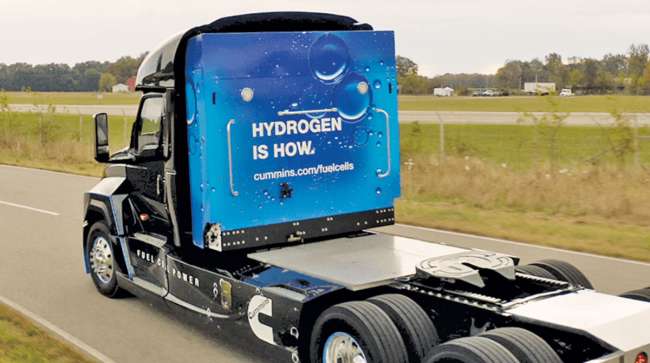Senior Reporter
Cummins Posts Strong Q2 Results

[Stay on top of transportation news: Get TTNews in your inbox.]
Cummins Inc. reported second-quarter net income and revenue soared, powered by North American engine sales.
At the same time, the company announced it was exploring what it called “strategic alternatives” for its filtration business unit, which it launched in 1958. The division notched annual sales of $1.2 billion in 2020.
Quarterly net income for the period ended June 30 jumped to $600 million, or $4.10 per diluted share, compared with $276 million, $1.86, a year earlier.

Linebarger
Revenue increased 59% to $6.1 billion compared with the 2020 period. Sales in North America increased 74% while international revenues increased 42% driven by strong demand across all global markets compared with the same quarter in 2020, which was impacted significantly by the pandemic, the Columbus, Ind.-based company noted.
“The strength of the order board reflects robust underlying demand in many of our markets, which is remarkable considering the challenges and uncertainty we faced during this same period last year,” Chairman and CEO Tom Linebarger said in a release. “I cannot thank our employees and the employees of our supply base enough for their unwavering contributions during these challenging times given the significant supply chain constraints we continue to experience in our industry.”
.@Cummins ($CMI) reports second quarter 2021 earnings results. https://t.co/WRYkYDL1Bn — Cummins Inc. (@Cummins) August 3, 2021
The engine segment, Cummins’ largest, improved revenue 75% to $2.5 billion compared with a year earlier. On-highway revenue increased 104% driven by strong demand in the North American truck and pickup markets and off-highway revenue increased 10% driven by strong demand in international construction markets, according to the company.
“We are investing in our engines and components businesses to develop advanced diesel and alternative fuel products which will be critical to meeting customer and regulatory requirements in the coming years,” Linebarger said.
In the components segment, revenue rose 73% to $2 billion compared with a year earlier.
The distribution segment posted revenue of $1.9 billion, a 20% increase.
The power systems segment had sales of $1.1 billion, up 47%.
Fuel Cells traveled to the moon and back in 1969, and now @Cummins is taking the next step to advance solid oxide fuel cell (SOFC) technology to help power a more sustainable world. Read more: https://t.co/aPSJFTrxJw #GenerationH #GreenEnergy pic.twitter.com/t02G1ATb4S — Cummins Inc. (@Cummins) July 29, 2021
The new power segment, Cummins’ smallest, saw sales spike 140% to $24 million compared with the 2020 quarter. Its revenue increased due to greater demand in transit and school bus markets, Cummins noted, in addition to shipments of fuel cell systems to the rail market, and electrolyzer revenue decreased driven by timing of commissioning of projects.
Meanwhile, Linebarger said the filtration business has improved its financial and operational performance over the past few years.

Could this be the trucking industry’s roaring '20s? Business is booming, thanks, in part, to a slew of innovative technologies. With host Mike Freeze, we begin to wonder what’s next? Hear a snippet above, and get the full program by going to RoadSigns.TTNews.com.
“The challenge is, looking forward, the opportunities to grow shareholder value look primarily to us to be in diversification,” he said. “The number of [filter] technology innovations for the truck business or for our [other] end markets look like they are limited in front of us.”0
But there remain opportunities to take that technology platform and global footprint to other filtration segments, and those look significant, he said.
“What is clear is the filtration segment has come to a size and performance level now where we think it can stand on its own, or it could be part of another bigger company that plans more diversification in other end markets,” Linebarger said.
He said Cummins was exploring everything from a sale to a spinoff or another kind of strategic option in an effort to realize value for Cummins’ shareholders.
“We know that when we are the best owner and can make the most of the assets, we are going to do that,” Linebarger said. “And when we are no longer the best owner, then we need to confront that, too. That’s what we are trying to do here.”
Want more news? Listen to today's daily briefing below or go here for more info:




